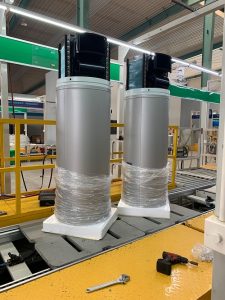A heat pump hot water tank is an advanced hot water supply system that utilizes heat pump technology to convert thermal energy from low temperature air into hot water. It not only heats water efficiently, but also features energy saving and environmental protection.
Heat pump hot water tanks are suitable for homes, hotels, public bathrooms and other places to provide a stable supply of hot water. Compared with traditional electric water heaters, heat pump hot water tank has lower energy consumption and longer service life. It can effectively reduce energy consumption and save money for users, as well as being friendly to the environment.

What is heat pump hot water tank?
A heat pump hot water system is a type of water heater that uses a heat pump to transfer heat from the surrounding air or ground to heat the water. It works by extracting heat from the air or ground and transferring it to the water, rather than generating heat directly. This makes it a more energy-efficient option compared to traditional electric or gas water heaters.
Heat pump water heaters use electricity to transfer heat from one place to another, instead of directly generating heat. Therefore, their energy efficiency is two to three times higher than that of traditional resistance water heaters. In order to transfer heat, the heat pump works in reverse like a refrigerator.
The refrigerator absorbs heat from the inside of the box and sends it to the surrounding rooms, while the independent air source heat pump water heater absorbs heat from the surrounding air and transfers it at a higher temperature to heat the water in the room. Storage tank You can purchase an independent heat pump hot water system as an integrated unit with built-in water storage tank and standby resistance heating elements.
Many homeowners may ignore the importance of a good water heater and the surprisingly high price of hot water. On average, each family spends 400 to 600 dollars a year to enjoy the luxury of taking a hot bath and hot water.
This process is the working principle of refrigerator, but the working principle of heat pump water heater is just the opposite, and refrigerator will exhaust hot air. Because they breathe in hot air, which makes them very suitable for a warm climate like Louisiana!
Can you run out of hot water with a heat pump?
If the water tank is too small, the hot water may run out. If it is too big, it will cost extra to keep the unused hot water, which may increase the electricity bill.
What is HPWH?
Often, it’s easier to move something than to make something. Using this principle, HPWH uses electricity to transfer heat from one place to another, rather than generating heat directly.
To understand the concept of a heat pump, imagine a refrigerator that works in reverse. The refrigerator takes heat from the closed box and emits it into the surrounding air, while the HPWH absorbs heat from the surrounding air and transfers it to the water in the closed tank.
During periods of high hot water demand, HPWH automatically switch to standard resistance heating (so they are often referred to as “hybrid” water heaters).
Types of Hot Water Heaters
There are several types of hot water heaters available for residential use. Let’s explore some of the most common options:
- Efficiency/Economy–Only use heat pump to heat water, maximize energy efficiency and save energy.
- Automatic/Mixed–The default setting is very suitable for daily use, providing energy-saving water heating with continuous heating.
- Electricity/heater-This demanding setup is the least energy efficient, and only electrical components are used to heat water.
- Vacation and timer (not available on all models)-Put the device in “sleep” mode when you go out until you return to save energy.
- Hybrid Water Heaters: Combining the functionalities of a heat pump and storage tank water heater, hybrid models offer improved energy efficiency. They can switch between heat pump mode and electric resistance mode, depending on demand and ambient conditions.
heat pump hot water tank youtube guide
Whether heat pumps are worth the investment?
Heat pump water heaters operating only in heat pump mode heat water more slowly than standard electric or gas water heaters, but they heat the same amount of water to the same temperature. For most people, when operating only in heat pump mode, a heat pump water heater can save $100 to $300 per year in electricity bills. Many people increase the tank size when switching to a heat pump water heater so they can run in heat pump mode only most of the time and save the most money.
If you need a new water heater and you have all the connections available (including power availability), then definitely yes.
If it’s just the two of you, and you rarely shower and don’t do much laundry, and you want to replace it with a working or near new water heater, it may not be worth it. Wait until it has to be replaced.
In addition, the price difference between installing it yourself and having it installed by a contractor can be significant and has a big impact on the payback period.

